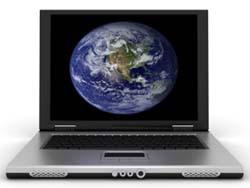 Isn’t the Internet wonderful? You can instantaneously be in touch with someone anywhere in the world, no matter the time difference, language barriers, or anything else. You can check Web sites halfway around the globe, even order products from those sites and have them shipped to you.
Isn’t the Internet wonderful? You can instantaneously be in touch with someone anywhere in the world, no matter the time difference, language barriers, or anything else. You can check Web sites halfway around the globe, even order products from those sites and have them shipped to you.
On the other hand, a disaster in the economy of Hong Kong might affect the U.S. stock market when it opens hours later, and our economic downturns can also have devastating effects on Europe and South America.
“In a globalized economy where space and time are increasingly dense, and everything is more interdependent, any event occurring anywhere in the system can make everything else in the system vulnerable,” author Jeremy Rifkin writes in the book “The European Dream.” This is a good read if you really want to investigate what makes societies and even countries and continents behave the way they do, including their economics. (But it ain’t no Danielle Steele!)
One of the things the above paragraph warns us about is that nowhere in the world can you separate yourself from other parts of the world. What happens in Japan affects the U.S. Do you remember the “chaos theory?” It became popular when it was discussed in the movie “Jurassic Park.” It proposes that a butterfly moving its wings in Australia can affect weather in North America. Events and ideas ripple and snake their way toward other parts of the world nowadays at a rapid pace.
In the world of economics, then, this is even more true. First, goods are sent from one country to another, manufactured in one part of the world and then sold in another (have you noticed, for example, how many common objects in the U.S. are now made in China?), and brands are crossing cultures and countries knowing no boundaries.
How many of you drive a Japanese car? How many of you use prescription drugs that were manufactured in Europe? Buy children’s toys that were assembled in China? This globalization of products means that the market has widened for both buying and selling of goods made by various international companies.
Secondly, stock exchanges in the last few decades have made earnest endeavors (successfully) to create markets globally. No longer are we solely concerned with the U.S. equities market; we can be interested in what is happening in Asia, and follow that market closely, too. We may stay tuned to the European stock exchanges because we find that the European Union corporations are where we want to be invested. Or, we find as we watch our own U.S. stock market, so do investors all over the globe. These merged global markets make it absolutely simple to buy or sell stocks no matter where the company is based.
When you buy a foreign stock, for example, you are really buying what is called an American Depositary Receipt, or ADR. This is the way most foreign stocks are traded on the U.S. stock exchanges. An ADR is issued by a particular American depositary bank, which stands behind the stock or company of the ADR it is issuing. This is why you can buy ADRs with confidence: there is an American bank backing it. (It is a lot more complicated than this, but this is enough of the concept for right now.)
So, when you decide you want to buy a foreign stock, it will usually be designated with the letters ADR to let you know that it is a foreign company backed by a U.S. bank. Go to your research site — the one you’re most comfortable with by now — and put in the symbol for Toyota Motors, TM, which is a company very familiar to Americans investors. When TM comes up, it will have ADR in parentheses. So you know that this company is an American Depositary Receipt company, not an American company. But you buy it and sell it through your brokerage account just as you would any American stock or company.
We are bound to see more and more advantages and repercussions of the shrinking globe in years and decades to come. As communications, transportation and other areas affecting the entire world become more and more sophisticated and the technology keeps improving, who knows? You may be able in a few decades to wake up, make a quick trip to Tokyo to buy a product — or a stock — that you like, then be home in time for dinner.
What the world of stock market investing will look like at that point is anyone’s guess. But I can guarantee you that buying low and selling high will still be the universal mantra for making money as an investor!
